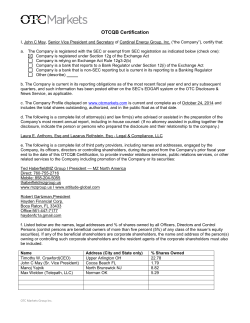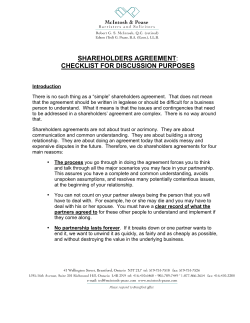
SHAREHOLDER AGREEMENTS: A CHECKLIST FOR DISCUSSION PURPOSES
SHAREHOLDER AGREEMENTS: A CHECKLIST FOR DISCUSSION PURPOSES © Phil Thompson – Business Lawyer, Corporate Counsel – www.thompsonlaw.ca If you are putting a business partnership together, there are lots of things you need to think about. Unfortunately most clients spend so much of their planning time on the business itself that they do not leave enough time or energy to plan their relationship as business partners. This can create big problems in the future. The purpose of these notes is to provide a framework for discussion between the partners before they get too far down the road, and before they meet their lawyer to finalize their legal structure and partnership.1 Introduction There is no such thing as a “simple” shareholders’ agreement2. That does not mean that the agreement should be written in legalese or should be difficult for a business person to understand. What it does means is that the issues and contingencies that need to be addressed in a shareholders’ agreement are complex. There is no way around that. Shareholders’ agreements are not about trust. They are about communication and common understanding. They are about building a strong relationship. They are about doing an agreement today that avoids messy and expensive disputes in the future. In our practise, we recommend shareholders’ agreements for these main reasons: Avoiding Misunderstanding or Mistaken Assumptions The process you go through in doing the agreement forces you to think and talk through all the major scenarios you may face in your partnership. This assures you have a complete and common understanding, avoids unspoken assumptions, and resolves many potentially contentious issues at the beginning of your relationship, including financing, contribution and commitment. Preparing for the Possibility of Intrusion by Third Parties You can not count on your partner always being the person that you will have to deal with. For example, he or she may die and you may have to deal with his or her spouse. Or they may go bankrupt and you will have to deal with their creditors. You must have a clear record of what the partners agreed to for these other people to be bound to implement if they come along. 1 Anticipating Failure and Success Success and failure each create conflict between partners3. A good shareholders’ agreement sets out how important matters are going to be addressed when you succeed (e.g. distributing profits, cashing in) or if you fail (winding up the company, getting out of the partnership, bankrupting the company). Anticipating the End of Your Partnership No partnership lasts forever. People develop in different directions. They get sick. They die. If your partnership breaks down or needs to change, you want to make changes as quickly, fairly and as cheaply as possible for all partners, and without destroying the underlying value of the business. However, please remember: You can always do anything you all agree on, no matter what the agreement says. The best shareholders’ agreements are often put in the drawer and never looked at again because the level of communication and understanding that good partnership agreements are based upon has been accomplished in the process of doing your shareholders’ agreement. The purpose of this checklist is to get you talking, to flush out the issues, and to encourage alignment. There will be things in here that may not apply to your situation. There may be things missing from this list that are important to you. Use this to get started. Figure out what you think you want to do. If it does not come too easy, just make a note of that item and keep moving on. After you have been through everything at least once as a partnership, go to see a good business lawyer. He or she will be able to help you finalize what works for your situation, will be able to provide a critique of your ideas, and will be able add more ideas of their own based on their experience in putting partnerships together and taking them apart. Planning the Business It is amazing how many clients will think they share the same vision for their business, and later find out they actually had different things in mind. The first stage in the process is to make sure you agree on what the business is going to look like. The Business and The Business Plan I strongly recommend that all clients have and maintain a basic business plan for their business.4 The process of getting ideas down on paper is very helpful in aligning partners and others. However, I do not recommend long or detailed plans for owner managed businesses, or the use of “fill in the 2 blank” templates or software. No two businesses are the same, and each plan document should reflect the unique heritage and vision of the business owners in question. What business will you be in, and why? What markets will you serve, and why? What will be your competitive strengths, and who will supply those? How will the business be operated, and who will do that? How will the business be financed, and who will do that? Have you prepared a financial model for the business, and had it vetted by an accountant? If not, why not? Do you have rolling financial projections for the business, and had them vetted by an accountant? If not, why not? Do you have a written sales and marketing plan, backed up by some objective market research? If not, why not? Do you have a documented business plan? If not, why not? Will you have an annual business plan or budget? If yes, how will you agree on it? Will you be bound to comply with it? How will you manage that? Why Are You In This Business and What Do You Each Hope to Gain From It Who will the partners be? Why are they in this business, at this time? What are they hoping to get out of the business, in terms of tangibles and intangibles? What vision do they have for the business, and how it will enrich their lives in terms of both tangibles and intangibles? How is the business going to make money for the partners? Giving them jobs? Paying them profits annually? Building a valuable business that can be sold at a later date? Some combination of all of those? How Long Do You Plan or Hope To Be Involved In The Business? How long do the partners plan to be involved in the business? Will the partners ultimately sell their investment or the business? When? To whom? How will that work? Or will you simply run it for cash flow for as long as it goes, and then wind it up? Do any partners plan or want to pass it on to their children or other family members? Personal Contribution and Commitment What Kind of Partnership Will You Have? 3 What kind of relationship do the partners have with each other now? What kind of relationship do the partners want to have with each other as it relates to the business or the partnership? Why? Are there any important partnership values or principles you want to characterize your partnership? What are they? Why are they important? What are the strengths and weaknesses of each partner? How do you complement each other? What are going to be your most likely areas of conflict? How will you handle that? Will some partners dominate in some areas? If so, which ones? Why? What risks are each partner willing to take on in relation to the business or the partnership? What risks are each partner actually going to take on in relation to the business or the partnership? If there are different risk factors for each partner, how will that be reflected in how the partnership is organized? Will some partners contribute more to the business? What? When? Why? Will some partners get greater rewards from the business? What? When? Why? What Will The Partners Contribute to Financing the Business? How is the company going to be financed? What monies or monies worth are the partners putting in? When? Is that to be loans or equity? If loans: Are they going to bear interest? Are they going to be secured? What are the repayment terms? When? How? Who decides? If equity: What kind? What attributes? Have you considered return of contribution, as well as return on contribution? What third party financing is going to be used? Who needs to approve that? Who will arrange that? Will personal guarantees be required? From who? What do they get for it? Will all partners share in the exposure? If so, how? What if more money is needed in the future? Who will decide? Where will it come from? Will partners be required to participate with more money, guarantees, etc.? If yes, on what terms? 4 What if a partner does not come up with their share? Or if you do if you can not agree on putting in more money? Alternatives include secured loans from parties that want to; forced dilution by the parties that want to; initiate some buyout time procedure by the parties that want to of the parties that do not want to; wind up the company. What Else Will Each Partner Contribute to the Business and the Partnership, In Both Tangibles and Intangibles? What else will each partner contribute to the vision, operations and business? Specific assets? Customers? Other support? Attitude? Energy? When? How? How will they be compensated or rewarded for that? How Will Each Partner Participate In Business Operations, If At All? What are the key issues related to operating and building the business? What time will each partner spend in the business, and doing what? For how long? How will they be paid for that? Partners as Employees Will partners be employees? Who? Why? What will they do? Who will they report to? How much autonomy will they have? Can they be fired with or without cause? By who? Under what terms? How are partner salaries/bonuses/commissions going to be set? What if you can not agree? (Arbitration? By who?) Restricting the Partners To Protect the Business What commitments do the partners have to make to each other to help support the business? What commitments do the partners have to make to the business to help support the business? What activities will the partners be obligated to do together through the business? What will the partners be free to do outside of this business? How do you manage all this without making it impossible for partners to make a living if they ever leave the business? 5 What kind of special covenants will apply to the partners while they are partners? e.g. noncompetition, non-solicitation, ownership of any inventions What about family members or others who are not partners? What kind of special covenants will apply to the partners after they cease being partners? e.g. non-solicitation, non-competition – What activities? In what territories? For how long? What about family members or others who are not partners? Is it different if a partner is forced out against their will? Or if they quit or walk away? Is it different if the company is no longer carrying on business? Partner Decision-Making Decision Making Generally, Strategic and Operational Consider both strategic issues (e.g. new partners, buying new businesses, selling the business) and operational (e.g. signing authorities on contracts and bank accounts, ability to make binding commitments on behalf of the company, hiring and firing, purchasing, selling, etc.). Are there any general principles for making decisions you want to see in the partnership? Will there be different kinds of decisions that get made in different ways? Who will the decision makers be? In what areas? Why? How will they make decisions? How will voting rights be handled? On day to day issues versus big issues? Is the general rule simple majority vote? Or something else? Are there things you all have to agree on? i.e. that require unanimous approval? What are they? Why do they have to be unanimous? How Will You Handle Disagreements? Of the things where minority partners can block the majority, or things that have to be unanimous, are their any that you would be willing to have resolved by arbitration etc. to avoid having a deadlock? Of the things where minority partners can block the majority, or things that have to be unanimous, are their some that you would be willing to resolve by some kind of “super majority” (e.g. 75%) to avoid a deadlock? If you do end up with things that create a deadlock, what would you do? Just live with it? Arbitration? Some kind of buyout mechanism? Wind up the business? Sell the business? 6 Distributing Profits Who will decide when to distribute profits to partners and how much to distribute? What if they can not agree? Arbitration? Deadlock? Are there any milestones you want achieved before profits are distributed? Are there any priorities for how profits should be used, especially in the early years? Are profits distributed based on shares only, or something else too? Transferability and Exit Strategies General Principles Can partners transfer their shares or investment? To who? Under what conditions? With what approvals? Any time or milestone based limitations? Any rights of first refusal? Are their different rules for different partners? Can A Partner Get Out of This Deal If They Want Out? How does a partner get out of this business if he or she wants out? Options include: wind up the business; sell the whole business; sell the whole business with rights of first refusal for each partner; majority buys out minority partner; shot gun buy sell; find a third party buyer for your shares; some combination of all of the above. Are their different rules for different partners? If the others are forced to buy you out: How will the purchase price be determined? What will be the payment terms? Any security? How will they finance that? Will you pay a penalty in the purchase price for leaving the partnership? Any restrictions on when or how you get? e.g. can not withdraw within first two years of starting out? Can The Partners Get Rid of A Partner They No Longer Want? Who decides? What voting? How will you handle it? Options include: wind up the business; sell the whole business with rights of first refusal for each partner; majority buys out minority partner; shot gun buy sell; find a third party buyer for their shares; some combination. If the others are forced to buy out: How will the purchase price be determined? What will be the payment terms? Any security? How will they finance that? Any restrictions on going this way? e.g. when – can not force out within first two years of starting out? 7 Are their different rules for different partners? Can Some Partners Force A Sale Of The Whole Business? With A Drag-Along? Can some partners force a sale of the whole company? If yes, under what terms? When/time delay? To who/third parties only? Would that include a right of first refusal for the minority? Would that include a “drag along” provision, whereby minority would be forced to sell on the same terms the majority is selling? Are their different rules for different partners? Can There Be A Change In Control Forced On Minority Partners? Can majority partners sell their investment and leave the minority behind? If yes, will the minority have a “piggyback” option, whereby the minority can force any buyer who is buying a controlling interest to buy the minority interest from them at the same time and on the same terms? Are their different rules for different partners? Do You Want A Shotgun Buysell? A “shotgun” means one party sets the price and the other chooses whether to buy or sell? Any restrictions, time or otherwise? Are their different rules for different partners? Note: shotgun clauses work best where you have partners of roughly equal percentage, with roughly equal financial strength, both of whom would probably want the business if the partnership fell apart. They can produce unfair results in different circumstances. How Will You Manage a Partner in Default? What do you do if a partner defaults in their obligations to the partnership? When do you do it? After how long? After what notice? How does it affect their profits? Their votes? Their right to appoint officers and directors? How do you get them out of the company? On what terms? Terms more onerous than forced out when not in default? Options include: wind up the business; sell the whole business with rights of first refusal for each partner; non-defaulting partner buys out defaulting partner at reduced valuation; find a third party buyer for their shares at reduced valuation; some combination. If the others are forced to buy out: How will the purchase price be determined? What will be the payment terms? Will there be security? 8 Are their different rules for different partners? How Will You Manage the Employee Partner? Who can fire an employee partner? With or without cause? Can an employee partner quit or resign? When? On what grounds? On what terms? Are they forced to sell out their shares and investment? On what terms? Can they insist on being bought out? On what terms? How will the purchase price be determined? What will be the payment terms? Will there be penalties or hardship for being terminated for cause? e.g. affect valuation etc. How does it impact their non-competition and non-solicitation obligations? How are things different in that regard if they are fired “for cause”? or “without just cause”? or they quit? or retire? How does this tie in to the other buyout clauses above? Including winding up the business; selling the whole business with rights of first refusal for each partner; shot gun buy sell; find a third party buyer for their shares; some combination. Are their different rules for different partners? What Will Happen If A Partner is Disabled? What if a partner becomes sick or disabled for an extended period of time? What will happen to their: Salary? Profit share? Shareholdings? - during the disability What will happen if they have not recovered after a certain period of time (e.g. six months)? Options include: wind up the business; sell the whole business with rights of first refusal for each partner; majority buys out minority partner; shot gun buy sell; find a third party buyer for their shares; some combination. If the others are forced to buy out: How will the purchase price be determined? What will be the payment terms? Will there be security? How will they finance that? Are their different rules for different partners? What Will Happen If A Partner Dies? This is a complex area that may require input from the company accountant and a life insurance representative. General Provisions: Can the company force their estate to sell out? Can the estate force the company or the other partners to buy them out? Can shares be left to children, spouses, etc.? Other Options include: wind up the business; sell the whole business with rights of first refusal for each partner; find a third party buyer for their shares; some combination. 9 Valuation Issues in Buyout: How are shares or investment valued? How is purchase price calculated? What are payment terms? Will there be security? How will the buyer finance it? Do you take the death into account in assessing value? Use of Insurance to fund Buyout: Do you fund this with insurance? How much insurance, and how is that updated? Who owns the insurance? Who pays the premiums? How do the funds flow? What do you do if a partner is not insurable? What do you do if insurance is too expensive? What do you do if insurance claim is denied? What if there is not enough insurance money? What if there is “surplus” insurance money? What Will You Do If A Partner Loses Control of Their Investment To A Third Party? What do you do if a partner loses control of their shares through bankruptcy, marital split up or some other circumstance? How does it affect their profits? Their votes? Their right to appoint officers and directors? How do you get them out of the company? On what terms? Terms more onerous than forced out when in control? Options include: wind up the business; sell the whole business with rights of first refusal for each partner; remaining partner buys out other partner; find a third party buyer for their shares; some combination. If the others have right to buy out: How will the purchase price be determined? What will be the payment terms? Will there be security? How is all that financed? Are their different rules for different partners? Legal Structure The Legal Entity What will it be – a corporation, partnership, joint venture, working association? Why? What name will it use? Who will be its business lawyers? Contact particulars? The Shareholders Their full names, including corporate names if corporations. 10 Who are the voting shareholders? How many votes will they have? What will they pay for their shares? When? Who are the equity shareholders – same as voting shareholders? What percentages will they own? What will they pay for their shares? When? Will there be an preference shares? If yes, why, what, and for what purpose? Share structure - have types and attributes of shares been agreed to? Has each shareholder consulted his or her accountant in that regard? Company Directors How may directors will you have? Who will they be? How will they be selected? What are their full names and home addresses? How will director voting work? Are their different rules for different partners? Have you met the residency test? If there is only one director, he or she must be a Canadian resident. If there are two directors, at least one must be a Canadian resident. If there are more than two directors, a majority must be Canadian residents. Company Officers Officers manage the day to day business of the company. There must be at least a President. Note: no Canadian residency requirements. How many officers will you have? What titles will they have? How will they be changed or selected? What are their full names and home addresses? Company Financial Matters Who will the company’s accountant be? What will be there contact particulars? Who will have a say in hiring and firing the company accountant? How will that be handled? What will be the company year end be? Will you have audited financial statements? Will all partners have full access to company books and records? What financial and other reports will be distributed to the partners? When and how? Who will have signing authority on the company bank account? With any dollar limits? Who will have a say in changing that? How will that be handled? 11 Other Considerations Is there anything else that is important to you and that you want addressed in your agreement? 1 The form of the business could be a partnership or a corporation. The issues and concepts raised in this checklist apply equally to partnerships and corporations. 2 This checklist is aimed at helping clients finalize a shareholders’ agreement, since most business partnerships are in the form of a corporation. However, most business people talk about being in a “partnership” and having “partners”. Also, in many cases the corporate structure uses holding companies, family trusts and other legal entities. Therefore I have referred to “partners” throughout this checklist, and in doing so I mean the people actually getting together to make the business happen, irrespective of the final form or structure of the business from a tax, accounting or legal perspective. 3 There is an article on my website on Partnership Disputes– go to www.thompsonlaw.ca. It actually makes good reading for people getting into a business partnership, especially those doing it for the first time. 4 There are templates and outlines for business planning documents on my website, if you need something to get you started – go to www.thompsonlaw.ca. 12
© Copyright 2025





















